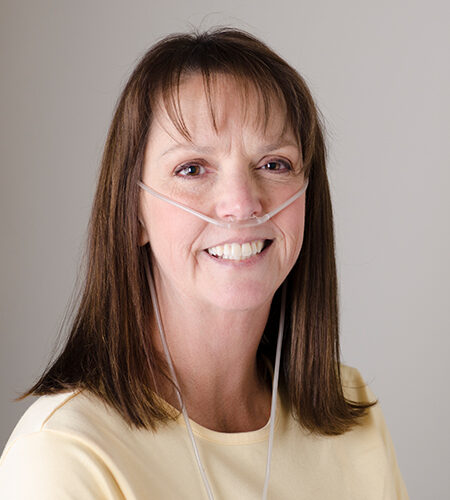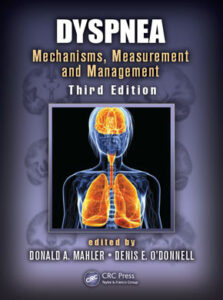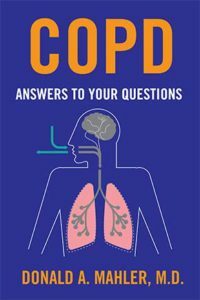Introduction to Dyspnea
Dyspnea is a medical word for “breathing discomfort.” A typical complaint by a patient is, “I can’t get enough air.” Dyspnea is the most prevalent symptom among patients with cardiac and respiratory diseases throughout the world. It is an independent predictor of mortality in those with heart disease, chronic obstructive pulmonary disease, and the elderly. Many developmental programs by pharmaceutical companies have included the measurement of dyspnea as an important outcome.
Description

The original Baseline (BDI) and Transition (TDI) Dyspnea Indexes were developed so that a health care professional could interview the patient about three components that affected his/her breathlessness related to activities of daily living. The interviewer would ask the patient open ended questions as part of the medical history, and then would select a grade, or score, using specific criteria for each of the three components. The interview method was chosen in order to allow a person with medical training or background the opportunity to grade breathlessness in a simple and brief encounter.
The objective of the Baseline and Transition Dyspnea Indexes is to measure the severity of dyspnea (breathlessness, shortness of breath) in symptomatic patients.
The Baseline Dyspnea Index (BDI) measures the severity of dyspnea at the baseline (or the beginning of a clinical trial).
The Transition Dyspnea Index (TDI) measures changes from this baseline (transition period) at subsequent visits.
The test is applicable to patients with dyspnea on exertion or at rest due to respiratory disease.
The Dyspnea Indices were devised such that grading breathlessness could be performed as part of obtaining a history from the patient. The indices include the categories Functional Impairment, as well as Magnitude of Task and Magnitude of Effort which provoke breathlessness. The interviewer asks specific questions based on the criteria of the various grades of impairment or change in the mentioned categories. This approach was selected instead of a questionnaire answered by the patient himself in order to allow an interviewer with medical training or background to grade breathlessness in a simple and brief encounter.
The BDI-TDI have been used as an outcome measure in many phase III clinical trials involving medications approved by the Food and Drug Administration and/or the European Medicines Agency for treatment of patients with COPD.
These include Serevent®, Spriva®, Advair®, Brovana®, Tudorza®, Daliresp®, Arcapta®, Ultibro®, Anoro®, Striverdi®, and Utibron®.
SAC BDI-TDI: In 2002 Dr. Mahler and John C. Baird, Ph. D., a research psychologist, developed the self-administered computerized (SAC) versions of the BDI-TDI in order to provide a direct patient-reported outcome (PRO) for quantifying dyspnea related to activities of daily living.
The BDI-TDI was created by Dr. Donald Mahler, whom Dr. Roberto P. Benzo of the Mayo Clinic has called “an expert in respiration.”
Instructions for Administration, Scoring, and Interpretation
Administration of the Index should be undertaken before any lung physiologic measurements on the test day and the interviewer must be blinded to other parameters evaluated for this patient.
The BDI as well as the TDI are composed of the three categories mentioned. The BDI includes five grades of severity from zero (very severe impairment) to four (no impairment) and the categories are summed to create the focal score (zero to twelve). The TDI ranges from minus three (major deterioration) to plus three (major improvement) including a zero score to indicate “no change”. Also for the TDI the three categories are added to obtain a focal score ranging from minus nine, including zero, to plus nine. Provision is made for circumstances when dyspnea cannot be rated: in the BDI, score “X” if no information on the severity can be obtained, “W” if there is generally insufficient information, or “Y” if the patient’s capacity is compromised by factors other than respiratory. In the TDI, score “Z” if reduction of activities, effort or functional impairment is caused by reasons other than respiratory.
An interviewer, who should be experienced in history taking for respiratory disease, administers the test. The interviewer should be a physician, nurse, respiratory therapist, cardiopulmonary technician or have a similar qualification with advanced knowledge or training concerning dyspnea in respiratory disease. Evaluation and scoring is performed during the interview and needs the same level of experience. It is preferred that the same person conducts all evaluations for each patient.
The initial question addressed to the subject should be “Do you experience shortness of breath?“. If the subject answers “No“, then the interviewer should ask whether any physical activities cause the subject to experience breathlessness. If the answer to the questions is “Yes“, then additional questions follow to achieve the specific grading. Questions concerning the patient’s shortness of breath should be open-ended, and concentrate on how the shortness of breath affects his/her daily life, e.g. the maintenance or upkeep of residence, gardening, or shopping. The interviewer should focus on the specific criteria for the severity of breathlessness as specified in the indices and the patient should be rated based on the responses to these questions. The interviewer circles one answer in the index that best describes how the patient’s daily activities are affected by his/her respiratory disease.
The interview process at each visit (baseline and follow up) should not take longer than five minutes.
Please visit ePROVIDE™ for additional information on the BDI-TDI!
Conditions of Use and Available Translations
The BDI-TDI is distributed by Mapi Research Trust on behalf of its copyright holder, Dr Donald A. Mahler.
Mapi Research Trust is a non-profit organization dedicated to improving patients’ quality of life by facilitating access to Clinical Outcomes Assessments (COAs) information by centralizing information. Visit Mapi Research Trust’s website for more information!
Any questions on the BDI-TDI, on its conditions of use, its available translations shall be directed to Mapi Research Trust.
Please submit your request directly into our ePROVIDE™ database and our PROVIDE™ team will get back to you as soon as possible!
The list of existing and available translations of the BDI-TDI is available on ePROVIDE™
Please see the detailed workflow for your request, whether you are
The BDI-TDI indexes have been translated into more than 80 languages and have been used to measure outcomes in numerous phase III clinical trials for COPD treatments.
Research Publications
Development and validation
- Mahler D.A., Weinberg, D.H., Wells, C.K., & Feinstein, A.R. The measurement of dyspnea: Contents, interobserver agreement and physiologic correlates of two new clinical indexes. Chest 1984; 85:75l-758.
- Mahler DA, Wells CK. Evaluation of clinical methods for rating dyspnea. Chest 1988;93:580-586.
- Mahler DA, Harver A. A factor analysis of dyspnea ratings, respiratory muscle strength, and lung function in patients with chronic obstructive pulmonary disease. Am Rev Respir Dis 1992;145:467-470.
- Mahler DA, Faryniarz K, Tomlinson D, et al. The impact of dyspnea and physiologic function on general health status in patients with chronic obstructive pulmonary disease. Chest 1992;102:395-401.
- Mahler DA, Tomlinson D, Olmstead EM, et al. Changes in dyspnea, health status, and lung function in chronic airway disease. Am J Respir Crit Care Med 1995;151:61-65.
- Witek Jr TJ, Mahler DA. Minimal important diference of the transition dyspnoea index in a multinational clinical trial. Eur Respir J 2003;21:267-272.
- Witek Jr TJ, Mahler DA. Meaningful effect size and patterns of response of the Transition Dyspnea Index. J Clin Epidemiol 2003;56:248-255.
Publications using the questionnaire
Books
Dr. Mahler’s books:
- Dyspnea. Futura Publishing Company, Inc., 1990
- Dyspnea. Marcel Dekker, Inc., 1998
- Dyspnea: Mechanisms, Measurement, and Management, 2nd Edition, Taylor & Francis Group, 2005, co-edited with Denis E. O’Donnell
- Dyspnea: Mechanisms, Measurement, and Management, 3rd Edition, CRC Press, 2014, co-edited with Denis E. O’Donnell.
- COPD: Answers to Your Questions. EBSCO books, 2014.
- Breathe Easy: Relieving the Symptoms of Chronic Lung Disease. ForeEdge, 2017.



Author
Donald A. Mahler, M.D., is Emeritus Professor of Medicine at Geisel School of Medicine at Dartmouth in Hanover, New Hampshire. He currently works as a pulmonary physician at Valley Regional Hospital in Claremont, New Hampshire, where he is Director of Respiratory Services.
Dr. Mahler’s research interests include the evaluation and treatment of dyspnea, particularly in patients with COPD. Under the mentorship of the late Alvin Feinstein, M.D., Dr. Mahler developed and established the psychometric properties of the interviewer- administered baseline and transition dyspnea indexes (BDI-TDI) which have been translated into over 80 languages. In collaboration with the late John C. Baird, Ph.D., Dr. Mahler modified the BDI-TDI into self-administered computerized (SAC) versions which have been translated into 20 languages for use in clinical trials.
Dr. Mahler and his research team at Dartmouth were the first to demonstrate neuromodulation of dyspnea. Using IV naloxone to block endogenous opioids, patients with COPD reported higher ratings of breathing discomfort during treadmill exercise (2009) and resistive load breathing (2011).
Dr. Mahler has authored/co-authored over 100 original research articles and 88 editorials, book chapters, and non-peer reviewed articles. In addition, he has written/edited six books on dyspnea.
Dr. Mahler has been selected by peers as one of the Best Doctors in America® for 2017-2018. Being named a Best Doctor recognizes about 4% of US doctors from whom other doctors would seek care.
Dr. Mahler has created a website dedicated to provide practical and current information that positively affects the daily lives of those with COPD and their families. Please visit: http://www.donaldmahler.com/!

Contact Us
Please contact our PROVIDE™ team for any questions on the BDI-TDI:
Mapi Research Trust
PROVIDE™
27 rue de la Villette
69003 Lyon
France
Telephone: +33 (0)4 72 13 66 66

